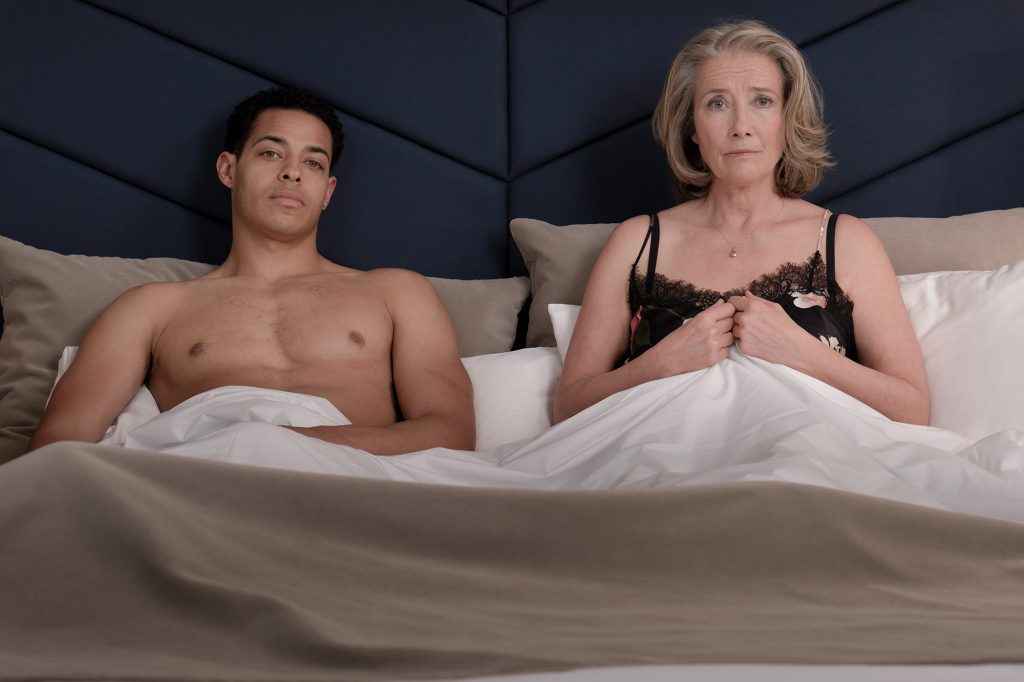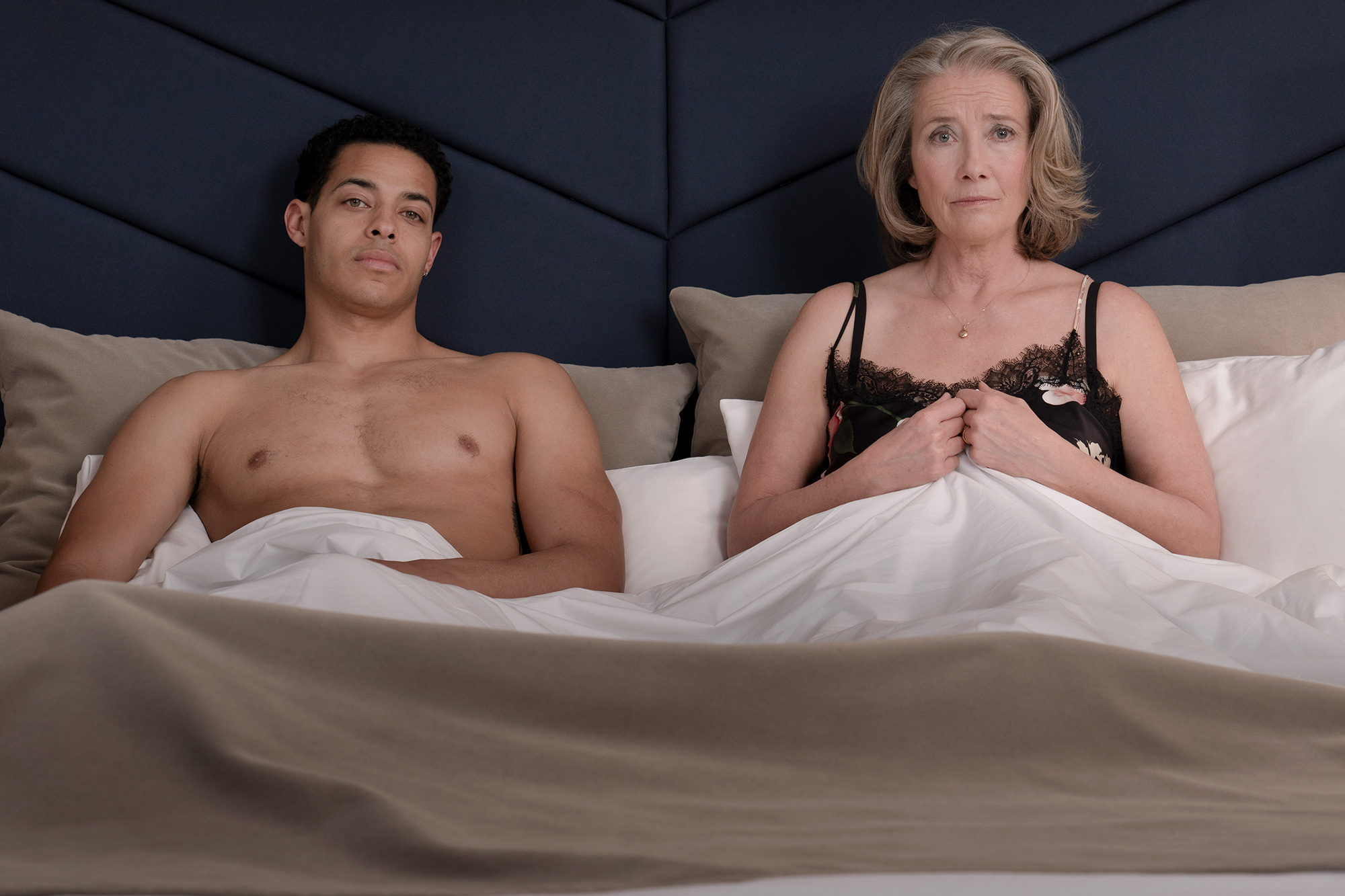
What do you think of your ageing body? — That’s Not My Age

Daryl McCormack and Emma Thompson in the film GOOD LUCK TO YOU, LEO GRANDE. Photo Courtesy of Searchlight Pictures.
Many of us are dissatisfied with how we look. But having a downer on what you see in the mirror can affect your wellbeing. As Emma Thompson bares all in her latest film, she’s won praise for her bravery, and many women are thinking about whether they feel comfortable looking at their own naked reflection.
In Good Luck to You, Leo Grande (in cinemas from Friday June 17, watch the trailer HERE, the actor plays a 55-year-old widow who hires a much younger sex worker, Leo Grande, to experience fulfilling sex for the first time. Afterwards, she looks at herself in the mirror, with new appreciation of her body and the pleasure it can bring. At 62, it was Thompson’s first-ever nude scene, and she commented: ‘Oh, God. Well, it’s very challenging to be nude at 62.’
The process of making the film included nude rehearsals with her co-star Daryl McCormack and director Sophie Hyde.
Thompson has previously condemned the pressure put on women by society and the creative industries to look a certain way, the conditioning of women to think that their bodies aren’t good enough, and has confirmed that she has her own body image issues. She has urged women to stop being self-critical. Speaking on BBC Radio 4’s Woman’s Hour (listen HERE), she said: ‘I don’t think that any woman I know stands in front of the mirror, and if they do they’re constantly tucking or tweaking. No matter what their bodies are like, we’re all the same, we are all dissatisfied and I think that’s a waste of our passion, our energy, our time, our money, our purpose in life.’
Who has poor body image?
The Mental Health Foundation report, Body image in later life, says that although concerns about body image and appearance are often associated with younger people, they’re not exclusive to youth. The report revealed that around one in five adults aged over-55 felt anxious or depressed because of their body image.
How body image impacts health
Females with negative thoughts and feelings about their bodies are more likely to develop certain mental health conditions, such as eating disorders and depression. Women with a positive body image are more likely to enjoy good physical and mental health.
A recent government survey by the Health and Social Care Committee found that 80% of participants agreed that their perception of body image had a negative impact on their mental health.
The charity Independent Age has also found that poor body image can have a serious impact on physical and mental health. Research has found that women aged 42 to 52 who were dissatisfied with their bodies were twice as likely to report clinically significant depression symptoms as those who were satisfied with how they looked.
Having a negative body image may also contribute to low self-esteem, which can make you less keen to be around other people or become obsessive about exercise and what you eat. But you can take steps to develop a healthier body image.
How to improve body image
The Mental Health Foundation suggests that small everyday actions can have a positive impact.
‘It may be helpful to be mindful of the ways in which we speak about our bodies in casual conversations with friends and family. Consistently speaking about our bodies, or others’ bodies, in ways that imply weight and youth are central to attractiveness and value (e.g. “I feel fat today”, “They don’t have the body to wear that”, “You look great, did you lose weight?”, “Ugh, look at my wrinkles”) may feel harmless in the moment, but can make us feel worse about our bodies in the long run.’
Focusing more on our bodies’ functionality, and the things that it can do for us, may help to support and improve our body image.
Focusing on physical activity and healthy eating for their social and wellbeing benefits, rather than as a way of building muscle or losing weight, may also be a good approach. Research shows a relationship between physical activity and positive body image.
Mirror exposure therapy (ME) is used to treat body image disturbances in people with major concerns about their appearance or weight, or people with eating disorders. It involves looking at your reflection and describing each part of the body neutrally and objectively.
When I look in the mirror I see things I like: feet, breasts, overall proportion. Of course I’d also prefer to have no visible veins or a big belly, but I don’t dwell on that. Hankering after the flat belly or unblemished legs we had years ago is pointless; every second of every minute of every hour of every day, everyone’s getting older and life events, or even just the passage of time, leave an impression on our bodies.
If you avoid looking in mirrors, then when you do see your reflection it might surprise you; do it every day and you get used to it!
Adrienne Wyper is a health and lifestyle writer and regular TNMA contributor.